- Home
- Julia Quinn
Because of Miss Bridgerton Page 2
Because of Miss Bridgerton Read online
Page 2
He edged carefully back to the end of the roof, turning around so that he could set one foot on the top rung of the ladder.
“Don’t forget the cat,” Billie directed.
“The cat,” he repeated, giving her a surely you jest look.
“I’m not going to abandon it after all this.”
George gritted his teeth, said something quite unsavory under his breath, and reached out for the cat.
Which bit him.
“Mother of—”
Billie scooted back an inch. He looked ready to tear someone’s head off, and she was closer than the cat.
“That cat,” George growled, “can rot in hell.”
“Agreed,” she said, very quickly.
He blinked at her speedy acquiescence. She tried for a smile and settled for a shrug. She had two brothers by blood and three more who might as well have been brothers in the Rokesby household. Four if she included George, which she wasn’t quite sure she did.
The point was, she understood men, and she knew when to keep her mouth shut.
Besides, she was done with that cursed animal. Never let it be said that Billie Bridgerton was in possession of a sentimental heart. She’d tried to save the mangy beast because it was the right thing to do, then she had tried to save it again, if only because it seemed like a waste of her previous efforts not to, but now . . .
She stared down at the animal. “You are on your own.”
“I’ll go first,” George said, moving over to the ladder. “I want you right in front of me the whole way. That way if you stumble—”
“We’ll both go down?”
“I’ll catch you,” he ground out.
She’d been joking, but it didn’t seem the wisest course of action to point that out.
George turned to descend, but as he moved to set his foot on the highest rung, the cat, which had apparently not liked being ignored, let out a bloodcurdling screech and dashed through his legs. George pitched back, arms pinwheeling.
Billie didn’t think. She didn’t notice her foot, or her balance, or anything. She just leapt forward and grabbed him, pulling him back to safety.
“The ladder!” she shrieked.
But it was too late. Together they watched the ladder pivot, spin, then fall with a strange balletic grace to the ground.
Chapter 2
It would be fair to say that George Rokesby, eldest son of the Earl of Manston and currently known to the civilized world as Viscount Kennard, was an even-tempered gentleman. He had a calm, steady hand, a relentlessly logical mind, and a way of narrowing his eyes just-so that ensured that his wishes were met with cool efficiency, his desires granted with breathless pleasure, and—and this was the most important part—all of this occurred according to his preferred schedule.
It would also be fair to say that if Miss Sybilla Bridgerton had any idea how close he was to going for her throat, she would look a lot more frightened of him than she was of the gathering darkness.
“That’s most unfortunate,” she said, peering down at the ladder.
George did not speak. He thought this best.
“I know what you’re thinking,” she said.
He unclenched his jaw for just long enough to say, “I am not certain that you do.”
“You’re trying to decide which of us you’d rather toss from the roof. Me or the cat.”
She was a lot closer to the truth than one might have predicted.
“I was only trying to help,” she said.
“I know.” Said in a tone that was not meant to encourage future conversation.
But Billie just went right on talking. “If I hadn’t grabbed you, you would have fallen.”
“I know.”
She caught her lower lip between her teeth, and for one blessed moment he thought she was going to let the matter drop.
Then she said, “It was your foot, you know.”
He moved his head about an inch. Just enough to indicate he’d heard. “I beg your pardon?”
“Your foot.” She motioned with her head toward the extremity in question. “You kicked the ladder.”
George gave up all pretense of ignoring her. “You are not blaming this on me,” he all but hissed.
“No, of course not,” she said quickly, finally showing a shred of self-preservation. “I merely meant—Just that you—”
He narrowed his eyes.
“Never mind,” she mumbled. She let her chin rest on her bent knees and gazed out over the field. Not that there was anything to see. The only thing moving was the wind, declaring its presence through the light ruffling of the leaves on the trees.
“I think we have another hour before the sun goes down,” she murmured. “Maybe two.”
“We won’t be here when it gets dark,” he told her.
She looked at him, then down at the ladder. Then back at him with an expression that made him want to leave her in the proverbial dark.
But he didn’t. Because apparently he couldn’t. Twenty-seven years was a long time to have the tenets of gentlemanly behavior schooled into one’s brain, and he could never be so cruel to a lady. Even her.
“Andrew should be along in thirty minutes or so,” he said.
“What?” She looked relieved, then annoyed. “Why didn’t you say something? I can’t believe you let me think we would be stranded up here all night.”
He looked at her. At Billie Bridgerton, the bane of his existence since her birth twenty-three years earlier. She was glaring at him as if he’d committed some unspeakable affront, her cheeks high with color, her lips pursed like a furious rose.
With great and icy enunciation he said, “One minute has passed between the time the ladder hit the ground and this moment, right now, as these words are leaving my lips. Pray, tell me, when, during your enlightening analysis of the motion by which my foot connected with the ladder was I meant to offer this information?”
The corners of her mouth moved, but it wasn’t quite a smirk. It was nothing that indicated sarcasm. If she were anyone else, he would have thought her embarrassed, or maybe even sheepish. But this was Billie Bridgerton, and she didn’t do embarrassment. She just did as she pleased and damn the consequences. She had done her entire life, generally dragging half the Rokesby clan down with her.
And somehow everyone always forgave her. She had that way about her—it wasn’t charm exactly—it was that crazy, reckless confidence that made people flock to her side. Her family, his family, the entire bloody village—they all adored her. Her smile was wide, and her laugh was infectious, and God in heaven but how was it possible he was the only person in England who seemed to realize what a danger she was to humanity?
That twisted ankle of hers? It wasn’t the first. She’d broken her arm, too, in typically spectacular fashion. She’d been eight, and she had taken a tumble from a horse. A barely trained gelding she’d had no business riding, much less trying to jump a hedge on. The bone had healed perfectly—of course it did, Billie had always had the devil’s own luck—and within months she was back to her old ways, and no one thought to scold her. Not when she rode astride. In breeches. On that same damned gelding over that same damned hedge. And when one of his younger brothers followed her lead and knocked his shoulder out of joint . . .
Everyone had laughed. His parents—and hers—had shaken their heads and laughed, and not a one of them thought it prudent to take Billie off the horse, shove her into a dress, or better yet, pack her off to one of those girls’ schools that taught needlework and deportment.
Edward’s arm had been hanging from its socket. Its socket!! And the sound it had made when their stablemaster had shoved it back in . . .
George shuddered. It had been the sort of sound one felt rather than heard.
“Are you cold?” Billie asked.
He shook his head. Although she probably was. His coat was considerably thicker than hers. “Are you?”
“No.”
He looked at her closely. She was jus
t the sort to try to tough it out and refuse to allow him to behave as a gentleman ought. “You would tell me if you were?”
She held up a hand as if to make a pledge. “I promise.”
That was good enough for him. Billie didn’t lie, and she didn’t break promises.
“Was Andrew in the village with you?” she asked, squinting off at the horizon.
George gave a nod. “We had business with the blacksmith. He stopped in to speak to the vicar afterward. I didn’t feel like waiting.”
“Of course not,” she murmured.
His head snapped around. “What is that supposed to mean?”
Her lips parted, then hovered for a moment in a delicate oval before she said, “I don’t know, actually.”
He scowled at her, then turned his attention back to the roof, not that there was a damned thing he could do at the moment. But it was not in his nature to sit and wait. At the very least he could examine the dilemma, reassess, and—
“There’s nothing to be done,” Billie said blithely. “Not without the ladder.”
“I’m aware,” he bit off.
“You were looking about,” she said with a shrug, “as if—”
“I know what I was doing,” he snapped.
Her lips pressed together in perfect concert with her brows, which rose into that annoying Bridgerton arch, as if to say—Go ahead, think what you wish. I know better.
They were silent a moment, and then, in a smaller voice than he was used to hearing from her, she asked, “Are you quite certain that Andrew will come this way?”
He gave a nod. He and his brother had walked to the village from Crake House—not their usual mode of transport, but Andrew, who had recently been made a lieutenant in the Royal Navy, had broken his arm doing some damn fool stunt off the coast of Portugal and had been sent home to recuperate. Walking was currently easier for him than riding, and it was an uncommonly lovely day for March.
“He’s on foot,” George said. “How would he come if not by here?” There were many footpaths in the area, but none that wouldn’t add a mile to the journey home.
Billie tipped her head to the side, gazing out over the field. “Unless someone gave him a ride.”
He turned slowly toward her, dumbfounded by the utter lack of . . . anything in her tone. There was no one-upmanship, no argument, not even a hint of worry. Just a bizarre, matter-of-fact—Hmmm, here’s a disastrous thing that might have happened.
“Well, he could have done,” she said with a shrug. “Everyone likes Andrew.”
It was true, Andrew had the sort of devil-may-care, easy charm that endeared him to everyone, from the village vicar to the barmaids at the public house. If someone was heading his way, they’d offer a ride.
“He’ll walk,” George said firmly. “He needs the exercise.”
Billie’s face took on a decidedly dubious mien. “Andrew?”
George shrugged, not wanting to concede the point, even though Andrew had always been a superb athlete. “He’ll want the fresh air, at the very least. He’s been climbing the walls all week. Mother has been trying to put him on broth and bedrest.”
“For a broken arm?” Billie’s snort gave way to a giggle.
George glanced at her sideways. “Taking joy in the misery of others?”
“Always.”
He smiled despite himself. It was difficult to take offense, not when he’d spent the last week enjoying—nay, encouraging—his younger brother’s frustration.
Billie gingerly shifted her position, bending her legs so that she could rest her chin on her knees.
“Watch that foot,” George said, almost absently.
She nodded, and together they lapsed into silence. George stared straight ahead, but he could feel every motion Billie made at his side. She brushed an errant strand of hair from her eyes, then stretched one arm out in front of her, her elbow creaking like an old wooden chair. Then, with the tenacity she displayed in all aspects of her life, she circled back around to their previous conversation and said, “All the same, he could have got a ride.”
He almost smiled. “He could.”
She was quiet for a few more seconds, then said, “It doesn’t look like rain.”
He looked up. It was overcast, but not thickly so. The clouds were too pale to be holding much water.
“And surely we will be missed.”
He allowed himself a smirk. “I will, at least.”
She elbowed him. Hard. Hard enough to make him laugh.
“You’re a terrible person, George Rokesby.” But she was grinning when she said it.
He chuckled again, surprised by how much he enjoyed the light fizz of amusement in his chest. He wasn’t sure that he and Billie qualified as friends—they’d butted heads far too many times for that—but she was familiar. That wasn’t always a good thing, but right now . . .
It was.
“Well,” she announced, “I suppose there’s no one with whom I’d rather be stranded on a roof.”
He swung his head toward her. “Why, Miss Bridgerton, was that a compliment?”
“You can’t tell?”
“From you?” he parried.
She smiled in an endearingly lopsided manner. “I suppose I deserve that. But, you know, you’re very dependable.”
“Dependable,” he repeated.
She nodded. “Very much so.”
He felt himself scowl, although for all that was holy, he had no idea why.
“If I hadn’t hurt my ankle,” Billie continued blithely, “I’m sure I would have found a way down.”
He regarded her with clear skepticism. Aside from the fact that this had nothing to with his dependability . . . “Didn’t you just say that it’s too far to jump?”
“Well, yes,” she said, her hand making a dismissive little wave in front of her face, “but I would have thought of something.”
“Of course,” he said, mostly because he lacked the energy to say anything else.
“The point is,” she continued, “that as long as I’m here with you . . .”
Her face went suddenly pale. Even her eyes, normally a fathomless shade of brown, seemed to blanch down to something decidedly more tepid.
George’s heart stopped. He had never, ever seen Billie Bridgerton with such an expression on her face.
She was terrified.
“What is it?” he demanded.
She turned to him. “You don’t think . . .”
He waited, but she seemed beyond words. “What?”
Her ashen face took on a greenish hue. “You don’t think that someone would think that you . . . that we . . .” She swallowed. “That we disappeared . . . together?”
George’s entire world lurched. “God, no,” he said. Instantly.
“I know,” she agreed. With equal alacrity. “I mean, you. And me. It’s laughable.”
“Absurd.”
“Anyone who knows us . . .”
“Will know we’d never . . .”
“And yet . . .” This time Billie’s words did not merely trail off, they sank into a desperate whisper.
He gave her an impatient look. “What?”
“If Andrew doesn’t come along as expected . . . and you’re missed . . . and I’m missed . . .” She looked up at him, her eyes huge and horrified in her face. “Eventually someone will realize that we’ve both been missed.”
“Your point?” he snapped.
She turned to face him directly. “Just that why wouldn’t someone assume . . . ?”
“Because they have a brain in their head,” he shot back. “No one would ever think I would be with you on purpose.”
She lurched back. “Oh, well, thank you.”
“Are you saying you wish someone did?” he retorted.
“No!”
He rolled his eyes. Women. And yet, this was Billie. The least womanly woman of his acquaintance.
She let out a long, steadying breath. “Regardless of what you think of me, George . . .�
�
How did she make his name sound like an insult?
“. . . I do have my reputation to consider. And while my family knows me well enough, and”—her voice took on a reluctant edge here—“I suppose trusts you well enough to know that our concurrent disappearances signify nothing untoward . . .”
Her words trailed off, and she chewed on her lip, looking uncomfortable, and, if one was honest, vaguely ill.
“The rest of the world might not be as kind,” he finished for her.
She looked at him for a moment, then said, “Quite.”
“If we’re not found until tomorrow morning . . .” George said, mostly to himself.
Billie finished the horrifying sentence. “You’d have to marry me.”
Chapter 3
“What are you doing?” Billie nearly shrieked. George had sprung to his feet with speed that was highly reckless, and now he was peering over the edge of the building with a calculating, furrowed brow.
Honestly, it looked as if he was performing complicated mathematical equations.
“Getting off the damned roof,” he grunted.
“You’ll kill yourself.”
“I might,” he agreed grimly.
“Well, don’t I feel special,” Billie retorted.
He turned, staring down at her with heavy-lidded superiority. “Are you saying you want to marry me?”
She shuddered. “Never.” But at the same time, a lady didn’t want to think that a man would prefer to hurl himself from a roof just to avoid the possibility.
“In that, madam,” George said, “we are agreed.”
And it stung. Oh, how it stung. Ah, irony. She didn’t care if George Rokesby didn’t want to marry her. She didn’t even like him most of the time. And she knew that when he did deign to choose a bride, the oh-so grateful lady wasn’t going to be anything like her.
But still, it stung.
The future Lady Kennard would be delicate, feminine. She would have been trained to run a grand house, not a working estate. She would dress in the latest of fashions, her hair would be powdered and intricately styled, and even if she possessed a backbone of steel, she would hide it beneath an aura of genteel helplessness.

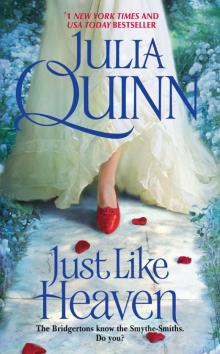 Just Like Heaven
Just Like Heaven B03.2 An Offer from a Gentleman Ep II
B03.2 An Offer from a Gentleman Ep II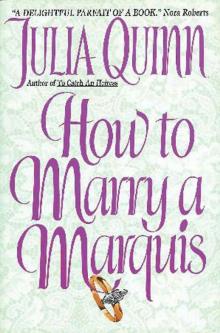 How to Marry a Marquis
How to Marry a Marquis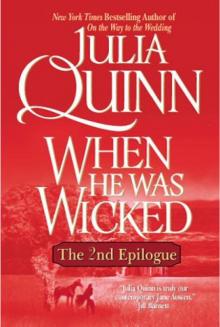 When He Was Wicked: The 2nd Epilogue
When He Was Wicked: The 2nd Epilogue Ten Things I Love About You
Ten Things I Love About You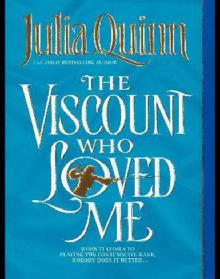 The Viscount Who Loved Me
The Viscount Who Loved Me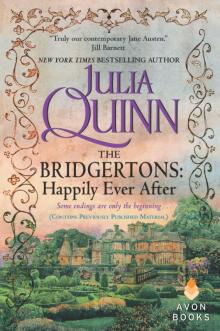 The Duke and I
The Duke and I B05.2 To Sir Philip With Love Ep II
B05.2 To Sir Philip With Love Ep II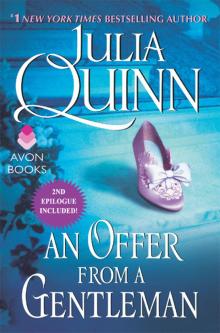 An Offer From a Gentleman: The 2nd Epilogue
An Offer From a Gentleman: The 2nd Epilogue Minx
Minx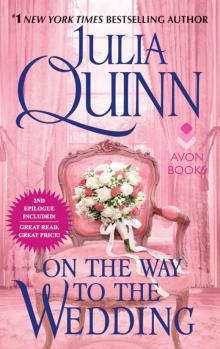 On the Way to the Wedding with 2nd Epilogue
On the Way to the Wedding with 2nd Epilogue Mr. Cavendish, I Presume
Mr. Cavendish, I Presume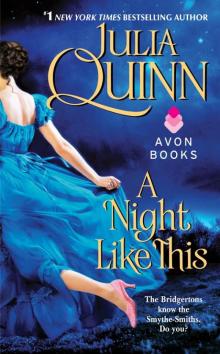 A Night Like This
A Night Like This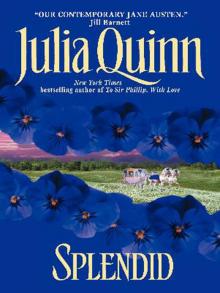 Splendid
Splendid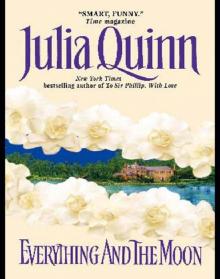 Everything and the Moon
Everything and the Moon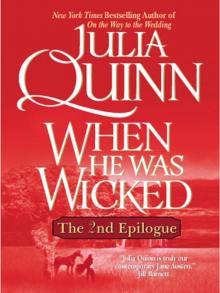 When He Was Wicked
When He Was Wicked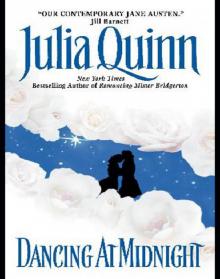 Dancing at Midnight
Dancing at Midnight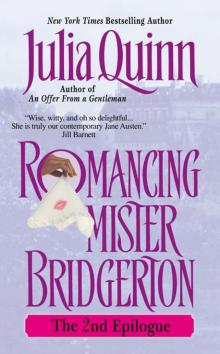 Bridgerton 04: 2nd Epilogue - Romancing Mister Bridgerton
Bridgerton 04: 2nd Epilogue - Romancing Mister Bridgerton The Lost Duke of Wyndham
The Lost Duke of Wyndham To Sir Phillip, With Love
To Sir Phillip, With Love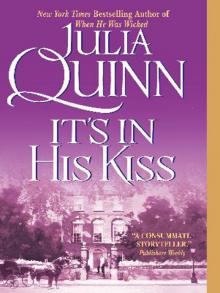 It's in His Kiss
It's in His Kiss The Other Miss Bridgerton
The Other Miss Bridgerton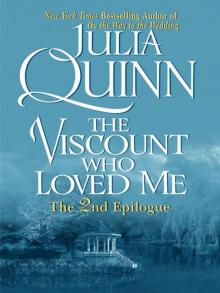 Bridgerton 02: 2nd Epilogue - The Viscount Who Loved Me
Bridgerton 02: 2nd Epilogue - The Viscount Who Loved Me The Secrets of Sir Richard Kenworthy
The Secrets of Sir Richard Kenworthy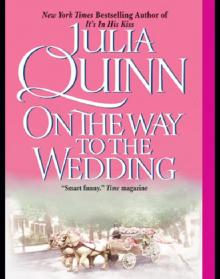 On the Way to the Wedding
On the Way to the Wedding The Secret Diaries of Miss Miranda Cheever
The Secret Diaries of Miss Miranda Cheever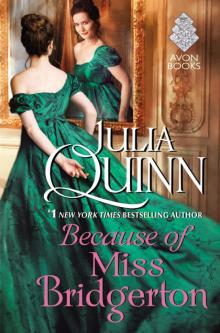 Because of Miss Bridgerton
Because of Miss Bridgerton What Happens in London
What Happens in London JQuinn - The Secret Diaries of Miss Miranda Cheever
JQuinn - The Secret Diaries of Miss Miranda Cheever The Girl With the Make-Believe Husband
The Girl With the Make-Believe Husband First Comes Scandal
First Comes Scandal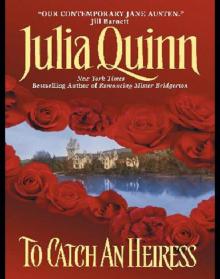 To Catch an Heiress
To Catch an Heiress The Sum of All Kisses
The Sum of All Kisses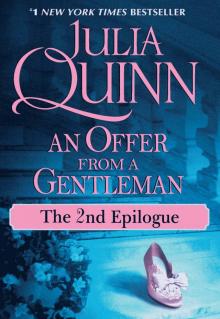 An Offer From a Gentleman
An Offer From a Gentleman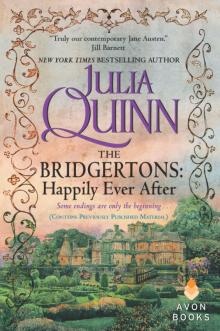 The Bridgertons: Happily Ever After
The Bridgertons: Happily Ever After Bridgerton Collection Volume 1 (Bridgertons)
Bridgerton Collection Volume 1 (Bridgertons)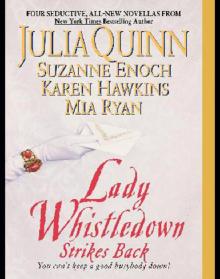 Lady Whistledown Strikes Back
Lady Whistledown Strikes Back Secret Diaries of Miss Miranda Cheever
Secret Diaries of Miss Miranda Cheever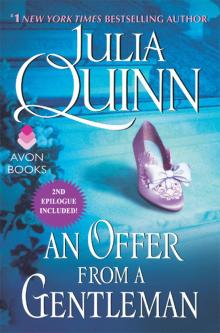 An Offer from a Gentleman with 2nd Epilogue
An Offer from a Gentleman with 2nd Epilogue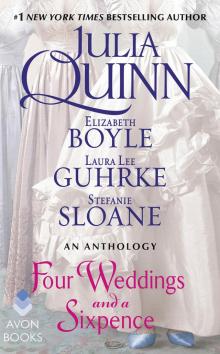 Four Weddings and a Sixpence
Four Weddings and a Sixpence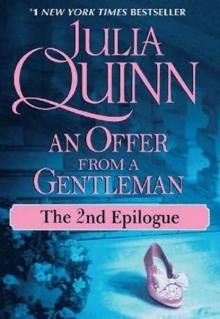 An Offer from a Gentleman: The Epilogue II
An Offer from a Gentleman: The Epilogue II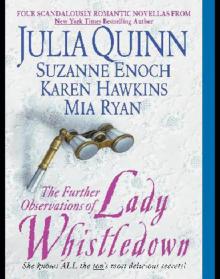 The Further Observations of Lady Whistledown
The Further Observations of Lady Whistledown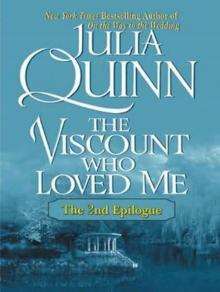 The Viscount Who Loved Me: The Epilogue II
The Viscount Who Loved Me: The Epilogue II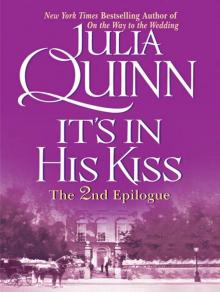 It’s In His Kiss Epilogue II
It’s In His Kiss Epilogue II To Sir Phillip, with Love: The Epilogue II
To Sir Phillip, with Love: The Epilogue II The Secret Diaries of Miss Miranda Cheevers
The Secret Diaries of Miss Miranda Cheevers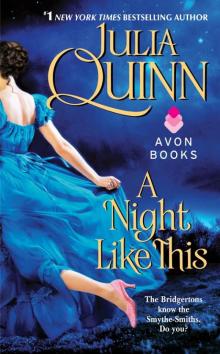 A Night Like This (Smythe-Smith Quartet)
A Night Like This (Smythe-Smith Quartet)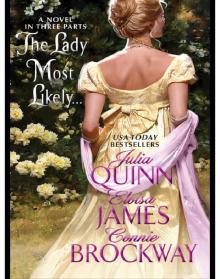 The Lady Most Likely...
The Lady Most Likely...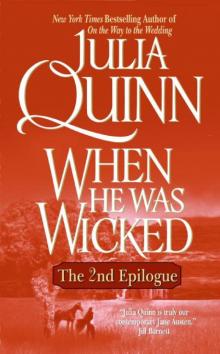 Bridgerton 06: 2nd Epilogue - When He Was Wicked
Bridgerton 06: 2nd Epilogue - When He Was Wicked Just Like Heaven sq-1
Just Like Heaven sq-1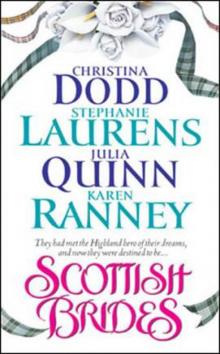 Gretna Greene
Gretna Greene